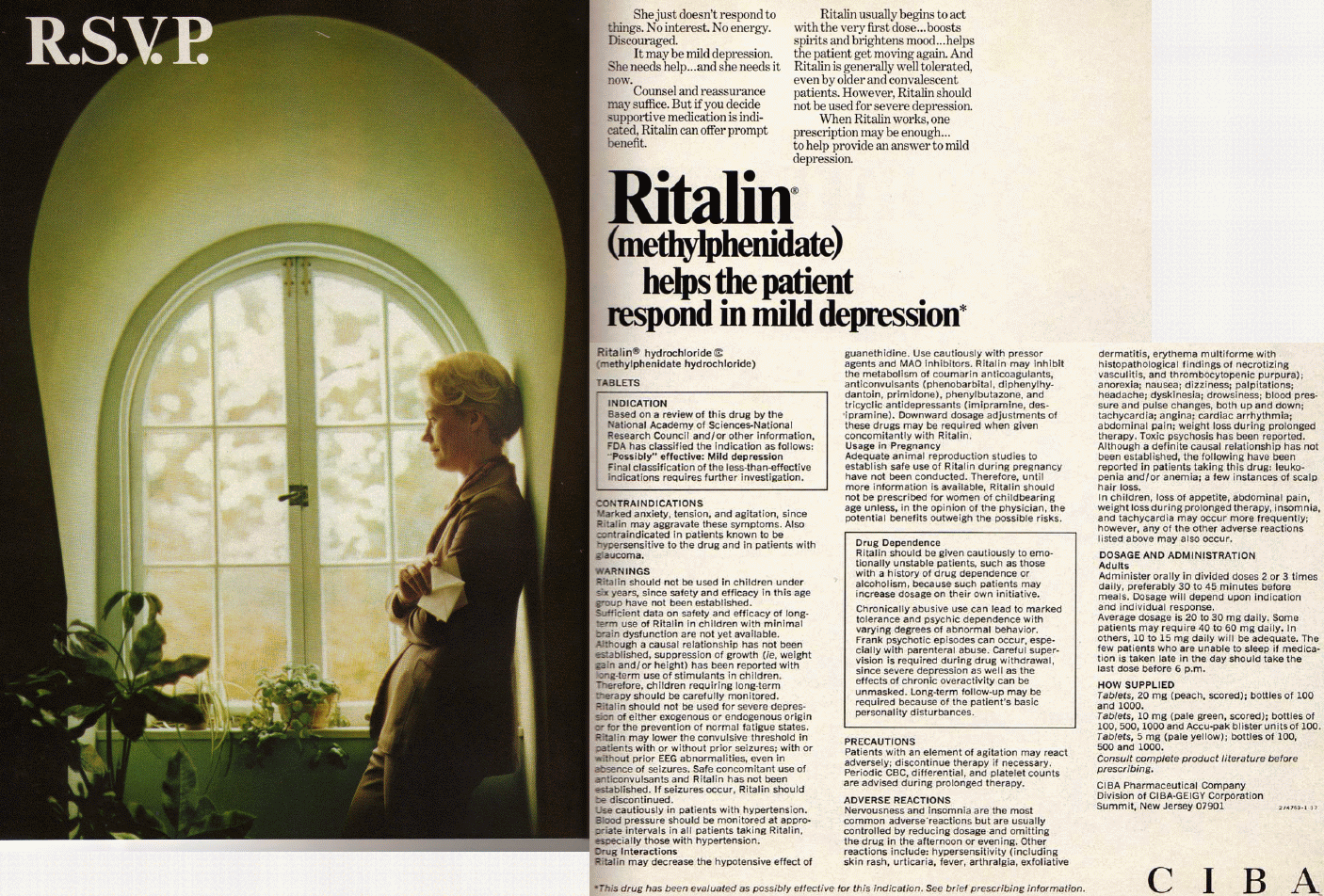
|
Ritalin advertisement Psychiatric Annals, October 1973, pp. 6-7. R.S.V.P. She just doesn't respond to things. No interest. No energy. Discouraged. It may be mild depression. She needs help... and she needs it now. Counsel and reassurance may suffice. But if you decide supportive medication is indicated, Ritalin can offer prompt benefit. Ritalin usually begins to act with the very first dose... boosts spirits and brightens mood.. helps the patient get moving again. And Ritalin is generally well tolerated, even by older and convalescent patients. However, Ritalin should not be used for severe depression. When Ritalin works, one prescription may be enough... to help provide an answer to mild depression. Ritalin® (methylphenidate) helps the patient respond in mild depression* ~ Ritalin® hydrochloride (methylphenidate hydrochloride) TABLETS INDICATION ~ Based on a review of this drug by the National Academy of Sciences - National Research Council and/or other information, FDA has classified the indication as follows: "Possibly" effective: Mild depression Final classification of the less-than-effective indications requires further investigation. CONTRAINDICATIONS ~ Marked anxiety, tension, and agitation, since Ritalin may aggravate these symptoms. Also contraindicated in patients known to be hypersensitive to the drug and in patients with glaucoma. WARNINGS ~ Ritalin should not be used in children under six years, since safety and efficacy in this age group have not been established. Sufficient data on safety and efficacy of long-term use of Ritalin in children with minimal brain dysfunction are not yet available. Although a causal relationship has not been established, suppression of growth (i.e., weight gain, and/or height) has been reported with the long-term use of stimulants in children. Therefore, children requiring long-term therapy should be carefully monitored. Ritalin should not be used for severe depression of either exogenous or endogenous origin or for the prevention of normal fatigue states. Ritalin may lower the convulsive threshold in patients with or without prior seizures; with or without prior EEG abnormalities, even in absence of seizures. Safe concomitant use of anticonvulsants and Ritalin has not been established. If seizures occur, Ritalin should be discontinued. Use cautiously in patients with hypertension. Blood pressure should be monitored at appropriate intervals in all patients taking Ritalin, especially those with hypertension. Drug Interactions Ritalin may decrease the hypotensive effect of guanethidine. Use cautiously with pressor agents and MAO inhibitors. Ritalin may inhibit the metabolism of coumarin anticoagulants, anticonvulsants (phenobarbital, diphenylhydantoin, primidone), phenylbutazone, and tricyclic antidepressants (imipramine, desipramine). Downward dosage adjustments of these drugs may be required when given concomitantly with Ritalin. Usage in Pregnancy Adequate animal reproduction studies to establish safe use of Ritalin during pregnancy have not been conducted. Therefore, until more information is available, Ritalin should not be prescribed for women of childbearing age unless, in the opinion of the physician, the potential benefits outweigh the possible risks. Drug Dependence Ritalin should be given cautiously to emotionally unstable patients, such as those with a history of drug dependence or alcoholism, because such patients may increase dosage on their own initiative. Chronically abusive use can lead to marked tolerance and psychic dependence with varying degrees of abnormal behaviour. Frank psychotic episodes can occur, especially with parenteral abuse. Careful supervision is required during drug withdrawal, since severe depression as well as the effects of chronic overactivity can be unmasked. Long-term follow-up may be required because of the patient's basic personality disturbances. PRECAUTIONS ~ Patients with an element of agitation may react adversely; discontinue therapy if necessary. Periodic CBC, differential, and platelet counts are advised during prolonged therapy. ADVERSE REACTIONS ~ Nervousness and insomnia are the most common adverse reactions but are usually controlled by reducing dosage and omitting the drug in the afternoon or evening. Other reactions include: hypersensitivity (including skin rash, urticaria, fever, arthralgia, exfoliative dermatitis, erythema multiforme with histopathological findings of necrotizing vasculitis, and thrombocytopenic purpura); anorexia; nausea; dizziness; palpitations; headache; dyskinesia; drowsiness; blood pressure and pulse changes, both up and down; tachycardia; angina; cardiac arrhythmia; abdominal pain; weight loss during prolonged therapy. Toxic psychosis has been reported. Although a definite causal relationship has not been established, the following have been reported in patients taking this drug: leukopenia and/or anemia; a few instances of scalp hair loss. In children, loss of appetite, abdominal pain, weight loss during prolonged therapy, insomnia, and tachycardia may occur more frequently; however, any of the other adverse reactions listed above may also occur. DOSAGE AND ADMINISTRATION ~ Adults Administer orally in divided doses 2 or 3 times daily, preferably 30 to 45 minutes before meals. Dosage will depend upon indication and individual response. Average dosage is 20 to 30 mg daily. Some patients may require 40 to 60 mg daily. In others, 10 to 15 mg daily will be adequate. The few patients who are unable to sleep if medication is taken late in the day should take the last dose before 6 p.m. HOW SUPPLIED ~ Tablets, 20 mg (peach, scored); bottles of 100 and 1000. Tablets, 10 mg (pale green, scored); bottlesw of 100, 500, 1000 and Accu-pak blister units of 100. Tablets, 5 mg (pale yellow); bottles of 100, 500, and 1000. CIBA Pharmaceutical Company ~ Division of CIBA-GEIGY Corporation ~ Summit, New Jersey 07901 *This drug has been evaluated as possibly effective for this indication. See brief prescribing information. CIBA |